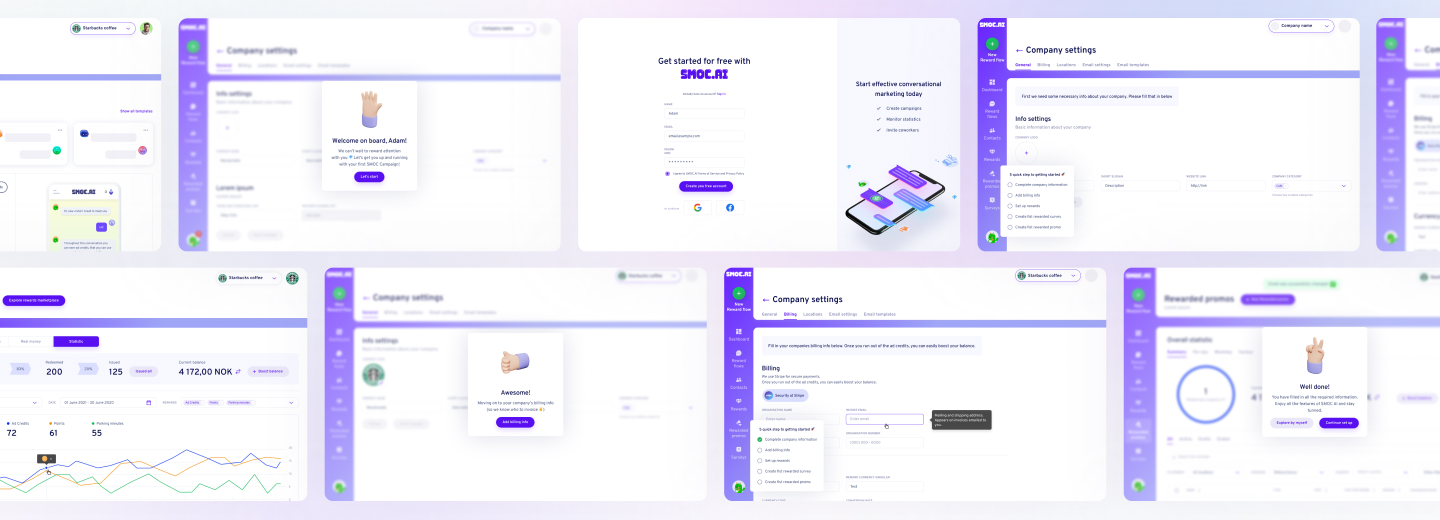Building a successful startup usually has a groundbreaking idea at its core. But together with that, it requires execution, structure, and the ability to pivot based on informed projections. Over the last decade, we’ve partnered with hundreds of founders, helping them turn concepts into operational businesses. And most companies have similar traits: every great venture starts with a robust business plan and deliberate planning. Though today this task is easier than before, as a new generation of business plan app, business planning software, and tools has made this process more accessible, data-driven, and powerful.
Long gone are the days when founders would toil over Word documents and scattered Excel sheets, second-guessing financial projections and piecing together market analysis at the eleventh hour before a pitch. Now, there is an unprecedented selection of intuitive and advanced business planning apps specifically built to meet the needs of startups at all stages. These tools do more than just organize thoughts, they can transform the way founders validate ideas, convince investors, and manage growth.
Understanding what makes these business planning tools special, and selecting the right one, can be a game-changer for your venture. Let’s dive into the fundamentals, examine and compare the top choices in the market today. The complementary table with the details included.
what’s in the article
- What is a Business Plan?
- 12 Best Business Planning Tools for Startups
- Selecting the Right Business Plan Software
- Advantages of Using Business Plan Software
- Conclusion
What is a Business Plan?
A business plan serves as the roadmap for a startup’s growth, especially with everything connected to money flows. It lays down the details of how the company will transition from an idea in the founder’s mind to a sustainable, scalable, and profitable business. At its core, a business plan documents the vision, strategy, financial projections, go-to-market plans, competitor analysis, and operational structures of a startup. Some of these items may seem unnecessary for an early startup, though their omission may lead to numerous problems in future.
For many founders, the process of building a business plan is as valuable as the resulting document. It forces deep thinking, requires data gathering and market validation, all the skills that can be new and uncommon for a start-up. On the same page, it creates an aligned vision that can persuade stakeholders and potential investors with strict numbers of expectations and deadlines.
Traditionally, these documents are stacked in binders or cloud folders, which results in complicated processing and analysis. But now, business plan software has changed the game: automation, built-in analytics, and real-time collaboration make them dynamic, interactive, and actionable.
Common sections in a business plan:
- Executive Summary
- Market Analysis
- Organization and Management
- Product or Service Description
- Marketing Strategy
- Sales Plan
- Funding Needs and Financial Projections
Fewer people consider a well-crafted plan to be a formality. It helps them to get great business results later on, as they can attract capital and build consensus among co-founders and teams with less stress.

Looking to Build an MVP without worries about strategy planning?
EVNE Developers is a dedicated software development team with a product mindset.
We’ll be happy to help you turn your idea into life and successfully monetize it.
12 Best Business Planning Tools for Startups
Choosing the best business plan software or an app for business plan creation can feel overwhelming with so many feature-rich options. Here’s an insider’s perspective on the best business plan software for startups, along with a breakdown of key capabilities and pricing. Most of them we used with our clients’ startups to make a proper start for a venture.
1. LivePlan
With decades of industry leadership, LivePlan continues to stand out as one of the most recommended business planning apps for startup founders. It offers numerous examples of ready-made plans to make your journey even easier, together with automation tools and AI features.
Key Features
- Step-by-step planning wizard
- 500+ sample plans from various industries
- Automated financial forecasting and benchmarking
- Visual dashboard for tracking business performance
- Real-time collaboration with team members
Cost
- Standard: $20/month (billed annually)
- Premium: $40/month (billed annually)
2. Bizplan
Bizplan is known for its clean user interface and easy onboarding. It has the specific modular “building block” approach to planning, perfect for those who prefer incremental progress. Together with assistance from planning experts, it becomes a great choice for first-time founders.
Key Features
- Drag-and-drop templates
- Guided plan builder with progress tracking
- Seamless integration with Fundable (for fundraising)
- Financial tools with visual layouts
- Collaboration and version control
Cost
- Monthly: $29/month
- Annual: $20.75/month (billed annually)
- Lifetime: $349 one-time payment
3. IdeaBuddy
IdeaBuddy serves founders in the earliest ideation and validation stages, blending an idea development toolkit with traditional business planning. It has numerous options for customisation of its models to make the planning suitable for any kind of business. Special AI tools allow making financial predictions and planning revenue beforehand.
Key Features
- Idea sketching and validation wizards
- Lean canvas and traditional business plan formats
- Financial planning tools suitable for beginners
- Intuitive roadmap feature
- Customizable templates
Cost
- Dreamer plan: Free
- Founder plan: $15/month
- Team plan: $35/month
4. iPlanner
iPlanner emphasizes simplicity, providing guided tools for sectors ranging from SaaS to restaurants and e-commerce. Its business modelling framework allows building a business model canvas in real time, so your team members can stay on track.
Key Features
- Ready-to-use business plan templates
- Export options (PDF, DOC, Excel)
- Integrated SWOT analysis
- Financial forecasting models
- Management dashboards
Cost
- Starting at $24/month
5. Enloop
Enloop’s focus on automation and analytics empowers founders to test scenarios and see instant scoring of their business plans. User-friendly design and onboarding guide make it easy for new founders to start their first plan.
Key Features
- Automated financial projections
- Real-time performance scoring
- Industry-specific sample text suggestions
- Multi-user collaboration
- Easy export and sharing options
Cost
- Detailed plan: $19.95/month
- Performance plan: $39.95/month
6. AchieveIt
Best suited for startups that require advanced tracking and execution features along with planning, AchieveIt offers robust strategic alignment tools for those who understand the power of data. It helps to oversee all aspects of internal strategy, from planning to execution and review, with further scaling.
Key Features
- Plan monitoring and real-time tracking
- Workflow automation
- Goal mapping and analytics dashboards
- Cross-departmental visibility and integrations
- Secure cloud-based platform
Cost
- Custom pricing, typically starts at several hundred dollars per month
7. Business Sorter
Business Sorter uses a card-sorting interface, streamlining planning for teams who like a more visual structure with fewer complex areas. Though being easier, it still allows your team to dive into business planning and creation of a roadmap for further development.
Key Features
- Unique card-based plan builder
- Built-in risk and issue tracking
- Simple sharing and permissions
- Collaboration for up to 30 team members
- Automatic reminders and notifications
Cost
- Starter: $10/month (up to 3 users)
- Standard: $30/month (up to 10 users)
- Plus and Enterprise plans available
8. GoSmallBiz
Founded by successful entrepreneurs, GoSmallBiz delivers beyond planning tools, a full suite of business management tools is included. Together with basic planning, the platform helps with marketing, basic compliance and legal. With their templates, you can make a business plan fast and without complexities.
Key Features
- Online business plan builder
- Financial projections tools
- Incorporation services
- CRM and HR document library
- Unlimited business consultation
Cost
- $39/month (all-in-one subscription)
9. EquityNet
Aimed at ventures seeking external funding, EquityNet connects businesses with investors and assists with the preparation of investment-ready plans. The platform allows building a plan and sharing it with investors, basically with a single tool. Though not every early-stage startup requires all set from the start of development.
Key Features
- Customizable business planning and analysis tools
- Crowd and enterprise funding platform integration
- Full financial modeling suite
- Investor-matching engine
- Patent and business asset management
Cost
- Basic: Free
- Premium: $299/year
- Professional: $2,490/year
10. PlanGuru
PlanGuru is well respected for its powerful forecasting and budgeting capabilities, ideal for finance-minded founders. It is rather flexible and offers customisation options to suit any founder. Perfect for the creation of both high-level and detailed business plans and predictions.
Key Features
- Advanced budgeting and forecasting (up to 10 years)
- 20+ standard forecasting methods
- Report creation and export (Excel, PDF, Word)
- Consolidation for multiple departments/units
- Integrations with QuickBooks and Excel
Cost
- $99/month per business
- Free trial available
11. StratPad
StratPad is designed for startups prioritizing strategic roadmaps and embedded learning resources. It makes strategic predictions and projections to make your roadmap clearer and help with investment.
Key Features
- Step-by-step business plan outline
- Built-in e-learning center for business concepts
- Financial plan generators
- Cloud-based secure storage
- Partnered with funding matchmaking services
Cost
- $29.99/month (after 30-day free trial)
12. Atlas Business Solutions Ultimate Business Planner 5.0
A classic desktop application for those who prefer locally-stored plans and traditional software. It helps gather all the data needed for the creation of strategic and deep plans based on real-world data.
Key Features
- Easy-to-use plan wizard
- 100+ sample plans and charts
- Built-in financial calculators
- Scenario modeling
- Customizable reports
Cost
- $99.00 (one-time purchase; Windows only)
Feature Comparison Table
| Software | Collaboration | Financial Projections | Investor Pitch Tools | Templates & Samples | Price Range |
| LivePlan | Yes | Yes | Yes | 500+ | $20-$40/month |
| Bizplan | Yes | Yes | Yes | Many | $21-$29/month |
| IdeaBuddy | Yes | Yes | Yes | Yes | Free-$35/month |
| iPlanner | Yes | Yes | No | Yes | $24+/month |
| Enloop | Yes | Yes | No | Yes | $20-$40/month |
| AchieveIt | Yes | Yes | No | No | Custom Pricing |
| Business Sorter | Yes | Yes | No | Yes | $10-$30/month |
| GoSmallBiz | Yes | Yes | No | Yes | $39/month |
| EquityNet | Yes | Yes | Yes | Yes | $0-$2,490/year |
| PlanGuru | No | Yes | No | Yes | $99/month |
| StratPad | Yes | Yes | No | Yes | $29.99/month |
| Atlas BSP 5.0 | No | Yes | No | Yes | $99 one-time |

Proving the Concept for FinTech Startup with a Smart Algorithm for Detecting Subscriptions

Scaling from Prototype into a User-Friendly and Conversational Marketing Platform
Selecting the Right Business Plan Software
Every startup has unique requirements, and selecting the most effective software for business planning or app depends on your product, audience, and internal processes. There are several questions I always pose to founders before recommending a business plan tool:
- How important is collaboration and version control for you? Will you be planning solo, or do you have a team?
- Do investors require specific formats or features (such as integrated pitch decks or scenario modeling)?
- Does your plan demand advanced financial forecasting or scenario-based analysis?
- Would you benefit from task management or execution tracking alongside planning?
- Is mobility important? Do you prefer cloud-based, desktop, or both?
- Are industry-specific plan templates necessary?
If you’re building a SaaS or high-growth product, look for software with deep financial modeling, integration with other business startup apps, and real-time sharing. For local businesses, simpler templates and straightforward projections may suffice. Founders who prioritize ongoing strategy tracking will appreciate platforms that blend planning with OKR-style execution tools.
Budget also factors in. Freemium models can assist with early validation, while more polished annual subscriptions may appeal once you secure initial funding.
Advantages of Using Business Plan Software
Why do so many founders make these platforms central to their business planning process? The shift from static documents to dynamic business plan tools offers a surprising array of benefits:
- Structure with Flexibility: Guided templates make it easier to organize your thinking, but remain customizable enough for unique aspects of your business.
- Real-Time Collaboration: Teams can work together, give feedback, and see changes instantly, reducing version control nightmares.
- Automated Financials: No more painful Excel guesswork. Many apps walk founders through the numbers, autofilling projections and even benchmarking against competitors.
- Scenario Planning: Test assumptions quickly. Build best, worst, and most likely case projections in minutes, not days.
- Accessibility: Access your plan from anywhere and update on the fly, whether pitching an investor at a cafe or iterating strategy before a new launch.
- Outcome Analytics: Integrated metrics let you track actual performance versus your forecasts, turning your plan into a living management tool.
The table below summarizes some additional strengths:
| Benefit | Description |
| Speed | Quick plan creation with drag-and-drop features |
| Investor-Readiness | Professionally formatted plans with embedded pitch decks |
| Education | In-app tips, sample text, and learning modules |
| Integration | Syncs with accounting, CRM, or funding platforms |
| Consistency | Built-in prompts ensure no key section is overlooked |
These business planning apps are not merely digital replacements for paper ones, as they give new opportunities for founders. Not only their form, but also the approach to the basic problem allows founders to secure funds and early investments with less stress.

Need Checking What Your Product Market is Able to Offer?
EVNE Developers is a dedicated software development team with a product mindset.
We’ll be happy to help you turn your idea into life and successfully monetize it.
Conclusion
Professional accountability can become frustrating for early-stage startups that seek guidance. That is why the market is flooded with numerous solutions helping them in this pursuit. Some of them are more focused on strategy and large amounts of data, while others are here to create a general high-level understanding of what the venture is and how it should move further. Each founder should consider their own needs and select carefully which platform can help them reach their goals.
In case you need assistance in integrating such platforms in your business or require general help with building your startup, you can always explore our startup consulting services to get expert guidance in business planning. So our experts can help you with any startup endeavour on the way to your success.
Start with making a market, user evaluation, making your own values and business economy. Validate your assumptions with research and real customer interviews wherever possible.
There are several formats, including: Traditional Full-Length (Comprehensive, with detailed market, operational, and financial analysis), Lean/One-Page (Summarising value proposition and business model), and Operational (Focused on execution and milestones for internal teams).
Most reputable platforms and apps for startups offer numerous security features for their clients, such as encryption, multi-factor authentication, user permissions, and audit logs. Always review security documentation and privacy policies, especially if you are entering confidential financial or strategic information.

About author
Roman Bondarenko is the CEO of EVNE Developers. He is an expert in software development and technological entrepreneurship and has 10+years of experience in digital transformation consulting in Healthcare, FinTech, Supply Chain and Logistics.
Author | CEO EVNE Developers


















